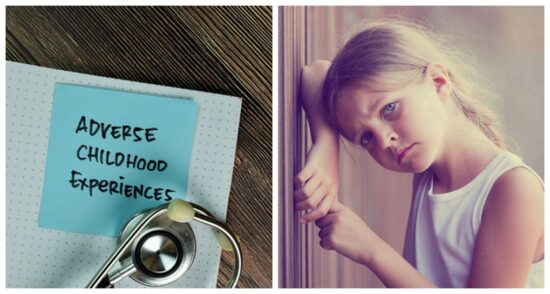Adverse Childhood Experiences or ACEs, are stressful or traumatic events and situations experienced in childhood. Abuse, neglect, or a relative in prison are just a few examples of adversity that the unfortunate child may face. The more ACEs a child experiences, the more likely it is that the child will do poorly in school or become a high-school dropout. Adults who as children suffered adverse childhood experiences, are at greater risk for disease. Over time, the stress caused by ACEs can cause long-lasting damage to body and brain. Therapy, physical exercise, and other stress-reducing activities may help to reduce or minimize the harm from ACEs.
The Ten Adverse Childhood Experiences
The term “ACEs” came from a 1995 study conducted by the Centers for Disease Control (CDC) and the Kaiser Permanente California healthcare corporation. This early study looked at three categories of adversity: abuse, household challenges, and neglect. Each category was broken down further for a total of ten types of adverse childhood experiences:
Abuse:
- Emotional Abuse
- Physical Abuse
- Sexual Abuse
Household Challenges:
- Mother Treated Violently
- Substance Abuse
- Mental Illness
- Parental Separation or Divorce
- Incarcerated Household Member
Neglect:
- Emotional Neglect
- Physical Neglect
Tallying Up the ACE Score
One of the advantages of this list is that it offers a way for us to quantify ACEs. You count the number of adverse childhood experiences to get the total. For example, the person who experiences ACEs in three categories: substance abuse, emotional abuse, and incarcerated household member gets an ACE score of three.
Some types of adverse childhood experiences are personal—they happen to the child. Others relate to family members, for example, the mother drinks, one spouse hits another, a brother is in jail. But the list of ACEs will probably always be incomplete. The loss of a parent in childhood, for example, is an obvious example of an adverse childhood experience not mentioned in the CDC-Kaiser Permanente study, and there are others. As the study is more than a quarter of a century old however, we can forgive its shortcomings: at the time, it was groundbreaking.
A critical finding from the same study is that most children experience ACEs. Over two-thirds of the population have had at least one ACE. A bit under 25 percent have experienced multiple ACEs of three or more. Adverse childhood experiences, it seems are all too common.
ACEs are not only common, but cut across class barriers. Children from middle class homes experience ACEs, too. Aside from these findings, the 1995 study found an abundance of data to suggest that these experiences lead to poor outcomes—even once the kids are all grown up. And as you might have expected, the more ACEs, the worse the outcome. Adults who experienced trauma as children were way more prone to poor academic achievement, time out of work, substance abuse, smoking, depression, obesity, heart disease, diabetes, and even early death.
Adverse Childhood Experiences and Toxic Stress
Someone who experiences many ACEs may develop something called toxic stress. The stress response system is set off each time a child experiences adversity. When children experience severe, frequent, or prolonged adversity, the development of the brain and other organs can be disrupted. The impact of toxic stress can be lasting. Toxic stress is more common in children without supportive parents or adults in their lives.
But no one should read about the long-lasting effects of adverse childhood experiences and despair. For all that adverse childhood experiences have forever consequences, these can be mitigated and the damage healed—at least to a degree. There are therapies of all kinds that can make a difference. Physical exercise can improve well-being on many levels. Finally, research shows that having caring, supportive relationships adults, especially from an early age, can reverse and even prevent the damage from ACEs and toxic stress.
